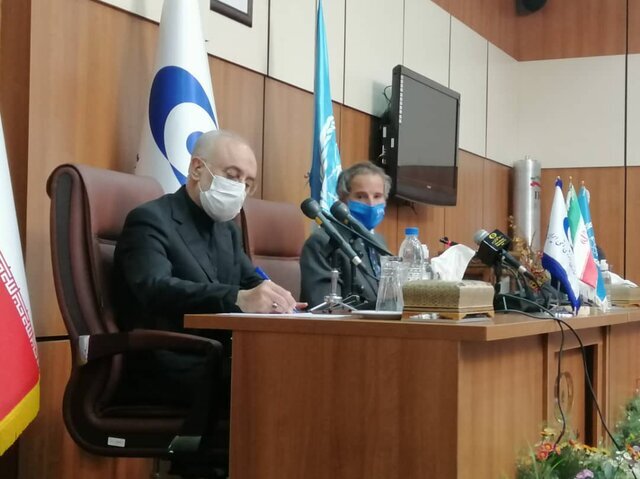TEHRAN – Iran’s nuclear chief Ali Akbar Salehi, who held talks on Tuesday with IAEA Director General Rafael Grossi, said Iran has not succumbed to illegal requests and will never succumb to such requests.
“Iran, in the past few years that a made-up case was brought up against it in the Agency, has not succumbed to requests outside of the legal frameworks, and it will never do so,” Salehi told a joint press conference with Grossi on Tuesday.
He said the Islamic Republic acts in accordance with its national sovereignty and interests and meets its obligations within the legal framework.
Salehi said it was agreed during the meeting that the UN nuclear watchdog do its duties professionally and independently.
“Our today’s talks were constructive and it was planned that the Agency push ahead with its work professionally and independently and we (Iran) also act within the framework of duties,” he remarked.
Salehi and Grossi who held talks for about one-and-half hours behind closed doors planned to meet again in the afternoon.
Rafael arrived in Tehran late on Monday.
Salehi, a nuclear physicist who is the director of the Atomic Energy Organization of Iran (AEOI), expressed hope that the visit by Rafael would have mutual benefit “so that the two sides would do their duties reciprocally and within the necessary framework.”
Salehi, a nuclear physicist who is the director of the Atomic Energy Organization of Iran (AEOI), expressed hope that the visit by Rafael would have mutual benefit “so that the two sides would do their duties reciprocally and within the necessary framework.”
“A new chapter has begun with this trip and our cooperation will continue more than before,” Salehi he stated.
Salehi concluded his remarks by thanking Grossi and his accompanying delegation and the IAEA for their cooperation.
Grossi claimed that the IAEA under his leadership is not influenced by other countries.
“There is no political approach towards Iran,” claimed Grossi, responding to whether the IAEA’s approach was a politicized one towards Iran ever since he became the IAEA director-general, according to ISNA.
“The cooperation between Iran and the IAEA has not been seized, and since I assumed office, no change has been made in our approach,” he added.
He also said the IAEA has had extensive cooperation with Iran in monitoring its nuclear program. “The IAEA’s judgments and conclusions are merely based on its technical findings.”
In a tweet after his meeting with Salehi, Grossi said, "This morning I met with #Iran’s Vice-President and Head of the Atomic Energy Organization of Iran, Dr Salehi. We are working on reaching an agreement on @IAEAorg’s safeguards verification activities in Iran."
Grossi’s trip comes after Washington pressured the UN Security Council to reimpose sanctions on Tehran that were lifted under Iran’s 2015 nuclear deal with world powers, from which the United States has withdrawn.
Tehran said on Monday that Grossi’s visit would “strengthen ties and build trust” between Tehran and the IAEA, “as long as the IAEA moves based on impartiality, independence, and distances itself from political pressure of another country”.
Iran’s Foreign Ministry has also announced that should the so-called snapback mechanism is triggered, Iran’s response will be “definitely decisive”.
Iran’s Foreign Ministry has also announced that should the so-called snapback mechanism is triggered, Iran’s response will be “definitely decisive”.
“The Islamic Republic of Iran’s response to any violation of Resolution 2231 and Barjam (the nuclear deal) will be carried out by [Iran’s] Supreme National Security Council, and this has been sent to the head of different countries in a previous letter,” Khatibzadeh said on Monday.
Also on Monday, Foreign Minister Mohammad Javad Zarif reiterated Iran’s readiness to cooperate with the IAEA, adding that the Islamic Republic will not allow the U.S. and Israel, which possess nuclear weapons, to ridicule the IAEA’s objectives.
TAGS
TAGS


No comments:
Post a Comment